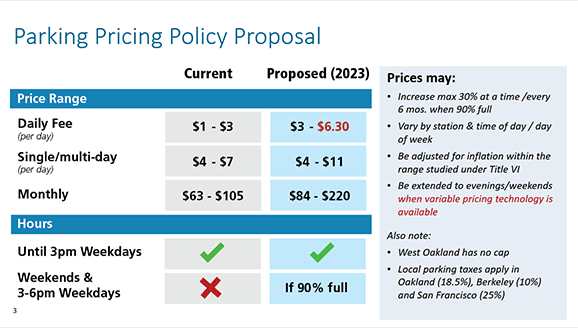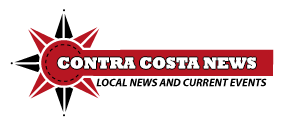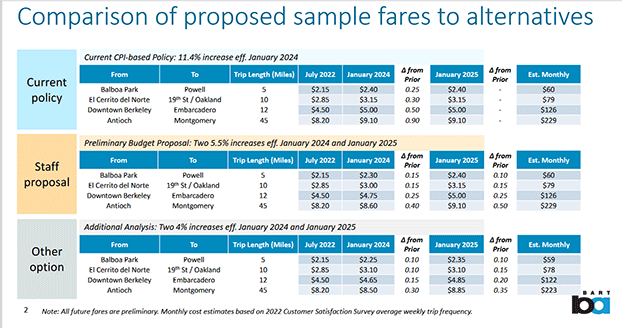On Thursday, the Bay Area Rapid Transit Board of Directors are looking at an inflation-based fare increase along with a clipper discount increase.
According to the Staff Report, they will look to approve a two Productivity-Adjusted Inflation-Based Fare Increases of 5.5% each on January 1, 2024, and January 1, 2025. They will also look at approving the continued participation in the Regional Means-Based Transit Fare Pilot Program, known as Clipper START, through June 30, 2025, and increasing the discount on BART from 20% to 50%.
BART has implemented productivity-adjusted inflation-based fare increases below inflation in 2003, 2013 and 2019. This was done by taking the average of national and Bay Area inflation over two years and then subtracting one-half percent for productivity improvements.
In January 2023, the Bureau of Labor Statistics released the final inflation data for 2022, which allowed for calculation of the 2024 increase. This calculation results in overall inflation of 11.9% over two years, which is the highest observed inflation since inception of the inflation-based fare increase policy.
After subtracting the 0.5% productivity factor, the actual fare increase by policy to be implemented in 2024 is 11.4%. To limit the immediate impacts of this fare increase on riders, BART staff propose instead to implement two smaller fare increases in 2024 and 2025 of 5.5% each.
Together the two inflation-based fare increases will supplant the second-to-last increase in the current series of three productivity-adjusted inflation-based fare increases.
According to BART:
Planned fare increases help the District avoid the cycle of keeping fares flat for many years, then raising fares by large percentages out of financial necessity. Before the Program, from 1972 through 2005, fare increases were irregular and generally large.
During the long gaps between increases, revenue eroded, and “catch up” increases became necessary, including a 30% increase in 1986 and a 45% increase over the three-year period from 1995 to 1997.
With the advent of the Program, planned small, regular increases have produced predictable less-than-inflation adjustments, which are consistent with the District’s Financial Stability Policy. In addition to these considerations, staff currently propose that the Board approve these increases given the significant fiscal distress currently imposed upon the District by the effects of the COVID-19 pandemic on ridership and funding sources. These proposed fare increases would generate critical revenue that supports BART operations as well as BART’s capital projects.
Continued participation in the Clipper START pilot program and discount increase from 20% to 50%
Since July 2020, the Metropolitan Transportation Commission (MTC) has led a Regional Means-Based Transit Fare Discount Pilot Program (Program), known as Clipper START, allowing riders aged 19-64 with incomes up to 200% of the federal poverty level to qualify for a transit fare discount.
The Program’s participants offering either 20% or 50% off single-ride Clipper adult fares consist of:
- AC Transit,
- BART,
- Caltrain,
- City Coach,
- County Connection,
- FAST,
- Golden Gate Transit and Ferry,
- Marin Transit,
- Muni,
- Napa VINE,
- Petaluma Transit,
- SamTrans,
- San Francisco Bay Ferry,
- Santa Rosa CityBus,
- SMART,
- SolTrans,
- Sonoma County Transit,
- Tri Delta Transit,
- Union City Transit,
- WestCAT,
- and Wheels.
Eligible low-income riders use a specially encoded free-of-charge Clipper card to receive a fare discount on the services of any of the participating transit operators. Eligibility verification is conducted by the Program’s third-party vendor and Cubic issues the discount Clipper cards to verified low-income riders. Although the pilot is scheduled to end after
Fiscal Year 2023, MTC staff will request a two-year extension of the pilot to their Programming and Allocations Committee on June 14, with a new end date of June 30, 2025.
Data gathered from this pilot will be used to evaluate the feasibility of a permanent program.
The proposal for the Program under consideration is for the District to continue its participation in the Clipper START pilot and to increase the discount for eligible Clipper START riders from a 20% per-trip discount on BART Clipper Adult fares to a 50% discount, effective January 1, 2024 alongside the first of the two proposed less-than-inflation fare increases. For example, if the Board approves the first of the staff-proposed 5.5% fare increase, the Clipper Adult fare from Balboa Park to Powell would be $2.30.
Under the current 20% discount level, the Clipper START fare would be $1.80 while under the proposed 50% discount level, the Clipper START fare would be $1.15. Discounted fares are rounded down to the nearest nickel to ensure riders receive at least the 50% discount.
FISCAL IMPACT:
The 2024 and 2025 Productivity-Adjusted Inflation-Based Fare Increases of 5.5% each are expected to generate up to $26 million of passenger fare revenue through FY25. In the first full fiscal year of the policy implementation (FY26), the increases are expected to generate $29 million in annual incremental fare revenue, growing steadily with ridership in the years thereafter, resulting in a cumulative $120 million through FY28.
Staff expect that the Clipper START discount increase to 50% will increase program uptake significantly but slowly after the discount increase, reducing passenger fare revenue by a cumulative $7 million through FY25. After reaching its steady state with an estimated fivefold increase in program uptake in FY27, the decrease in passenger fare revenue is estimated at $6 million per year.
If the Board does not approve the actions, it would require staff to identify other revenue sources and/or cost reductions to balance future operating budgets and fund capital projects, and BART’s low-income riders enrolled in the Program would return to paying Clipper Adult fares after June 30, 2023

BART Looks to Update Parking Policy
Policy Proposal
Staff are proposing a new parking policy, detailed in Attachment A, that updates the allowed price ranges for BART’s parking products and allows inflation adjustment of the range over time within limits studied under Title VI. The proposal also expands the hours during which parking is charged to include afternoons and weekends if a certain occupancy threshold is met. Parking charges may only be expanded to these time periods after the District has implemented technology necessary to allow price variations by time of day or day of week.
On May 25, 2023, a public hearing was held at a regularly scheduled meeting of the Board to consider changes to the parking policy. At the same meeting, the Board approved the Parking Policy Title VI Analysis, which found that implementation of the parking policy would not have a disparate impact on minority parkers but may potentially create a
disproportionate burden on low-income parkers, and recommended initially capping the Daily Fee parking price at $6.30 rather than $8.00 as originally proposed.
Bay Area Rapid Transit Documents:
- BART Agenda – click here
- Staff Report – click here
- Staff Report Presentation – click here
May 30: BART Board Refuses to Look at Service and Budget Cuts

